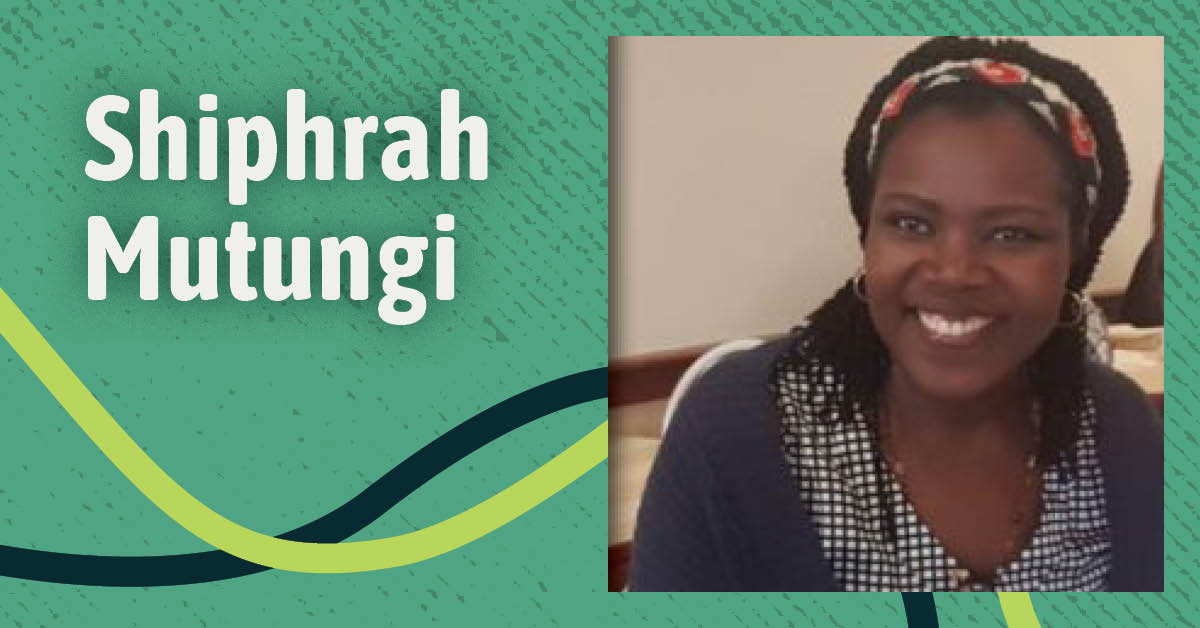When Shiphrah Mutungi decided two years ago to pursue a PhD in the interdisciplinary field of Leadership and Change, she knew where her focus would be: she would study peace-building. This was not an abstract interest. She had spent the last two years living part-time in Juba, the capital of South Sudan, a country that has experienced civil war for most of the previous 60 years. She was working at a program called Morning Star that focused on healing trauma and building peace, but some days she couldn’t even go to the office because there was gunfire in the streets. When she was able to do her job, many of the people she worked with were former child soldiers – who she came to have deep empathy for.
All of this was teaching her an essential lesson about peace: “It’s more than signing papers. It’s more than signing peace agreements.” Now, as Mutungi begins work on her dissertation, she is looking to spread to a wider audience the lessons she has learned about what really matters: “trauma healing, relationship building, and non-violent approaches to peace-building.”
Work in South Sudan
In 2015, Mutungi went to South Sudan to work at Morning Star developing a program to heal trauma and build peace. It was important work in a country deeply riven by communal violence and a history of war. South Sudan only gained its independence from the Republic of the Sudan in 2011, after 98.83% of voters in a plebiscite voted to leave. The excitement of independence gave way in 2013 to renewed civil war, which has continued on and off to this day. The fighting contributes to widespread hunger, which has left the country deeply reliant on food shipments and agricultural subsidies from USAID and other foreign-aid organizations. In an attempt to address the deeper causes of violence and conflicts, USAID had created the Morning Star program to raise awareness around trauma and build community resilience. Working as one of few staff at a small program, these problems seemed so big, Mutungi found it hard to know where to start.
With just a three-month contract, Mutungi worked to collect facts, meet people, and figure out what the program should be doing. The work was interesting and important, and she was good at what she did. She was invited to stay for another three-month contract, and at that point she realized, “Okay, I probably need another twelve months to do a pilot project.” Once that pilot ended, she explains, “that was a time when I could design something meaningful and more context-related for the people I was serving. I was like, ‘Okay, now I really need to do this. I have tested the tools. I need to be able to do it, because this is what we need to do.’”
Eventually, Mutungi spent four-and-a-half years in the country, reached over 30,000 people with the programs she designed, and trained thirty master trainers to teach this curriculum. She largely worked with former child soldiers, victims of communal violence, and those traumatized by war and hunger. The program, according to a USAID report, was “focused on helping communities understand the impact of trauma, teaching self-care techniques and creating hope and awareness of possibilities for breaking cycles of violence and building resilience.” Mutungi and her colleagues developed five-day and two-day programs that could be used in the villages and communities of South Sudan.
Says Mutungi, the most important work is “Awareness-raising and helping the communities identify and know the relationship between violence and conflict and trauma. [After that we] provide simple tools and strategies on how to address the impact of trauma.” She and her colleagues were able to document impressive results, too. She says that “more than 75% of the people are most likely to get over the impact of trauma, without needing clinical intervention. That is what we built ourselves on.”
Joining the Antioch PhD
This work led directly to Mutungi joining the PhD program offered by the Antioch Graduate School of Leadership and Change. The low-residency model allows her to travel to the U.S. three times a year to attend face-to-face classes, meet in-person with her teachers, classmates, and the rest of the time, she studies intensely but at a distance. Her studies have been made possible by scholarships from Antioch’s Dr. Alan Guskin Award and the American Association of University Women.
In choosing Antioch, she particularly was drawn to the opportunity to tailor her field of study to peace-building. She appreciated how the leadership focus of the program could be tailored to her specific area of research. As she explains, “It allows you to take the theories from the class and from the readings into any area of your interest, and I’ve found everything very applicable.”
She also found that, as a program director at Morning Star, she was able to take school assignments and apply them directly to her work. For one assignment, she was supposed to pilot a curriculum. “I went step by step, as I had been instructed, to form a planning committee, to depend on the planning committee and what they decide, to use the evaluation tactics that I had learned to evaluate the outcome of the project.” While many of her peers were imagining how they would apply these lessons in the real world, Mutungi explains that she “used the same groups that my organization was piloting the curriculum on. I did not have to fake it.”
Perhaps most importantly, these studies are helping her to formulate her own concept of what leadership means and looks like. While institutions like the Nobel prize often focus on dramatic acts of resistance and the signing of grand treaties, Mutungi has come to see her role as less grand if no less important than all that. She says, “At the end of the day I am not thinking about leadership in terms of positions; I’m thinking about leadership in terms of the spaces we are occupying. So if I am in the field of peace-building, how can I translate what I’m getting from there?” The PhD in Leadership and Change has facilitated this understanding because, as she says, “It is a degree that allows you to grow in any direction you would like to take.”
The End of Morning Star and What Comes Next
Last year Mutungi left her position at Morning Star, though only because the project came to an end. In most cases USAID projects run for a specified period of time, so despite being extended for an extra year, Morning Star shut down in 2019. Even though she and her colleagues had known that the funding would come to an end, they had held onto hope that they would instead be able to expand it and bring trauma healing to the entire country. “We were talking about serving 12 million South Sudanese,” says Mutungi. “And we knew we would never get a program that would cover 12 million people, but we thought we could get a program that would cover at least different groups up to a good number whereby they can carry on on their own. And we had barely reached 30,000, so it was very sad to see us close.” There was some hope in the fact that she had trained thirty local people to deliver the Morning Star curriculum, but, without external funding to pay for their travel and costs associated with gathering people, it’s hard to see how they will be able to continue the work.
Mutungi sees Morning Star’s legacy as two-part. They developed the skills and knowledge of thirty local “Master Trainers,” and even if they can’t find funding to continue the work right now, Mutungi says “I know what will never fade is their skills.” The other lasting effect is that they showed proof that the concept of healing trauma through awareness and resilience is a good one. “I looked back and I said, ‘What did we do here?’ I looked at existing local capacity. I looked at the people who had testified that our training had impacted them positively. And I was like, ‘You know what? That is our contribution. The other programs will start from there.’”
In the meantime, Mutungi is focusing with renewed intensity on her studies, as she hopes to graduate and receive her doctorate. After that, she knows only that there will be plenty of work. She points out that while there have been violent conflicts around the world, over the last thirty years “Africa takes more than 30% of the share.” Mutungi will keep working to change that. “If I could be of any help to any of these different settings within my region, I would be very happy to be valuable for such kind of work.”




